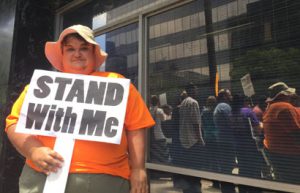State budget ignores the needs of people with developmental disabilities

On June 16 Governor Edmund G. Brown Jr announced a California budget agreement for $115.4 billion. The budget reflects an improved economy and resources returning to schools and low-income Californians. However, people with disabilities and the people who provide vital services for them were given nothing.
The entire system that provides services for people with Down Syndrome, Cerebral Palsy, Autism, intellectual disabilities and other developmental disabilities is about to collapse according to a February 2015 report. There are 21 Regional Centers throughout California that receive federal and state money and contract services for people with disabilities.
The report prepared by the Association of Regional Center Agencies is ominously titled “On the Brink of Collapse.” An excerpt states the main idea in a nutshell: “California can no longer assure the federal government that sufficient services and supports are available to ensure the health and safety of Californians with developmental disabilities, putting billion of dollars of federal funds at risk.”
The report, details how residential homes and day programs throughout the state have been forced to close or offer reduced services due to lack of funding. https://cms.laprensa.org/sites/default/files/2015/02/on-the-brink-of-collapse.pdf
In San Diego-Imperial Counties, the Regional Center provides services for 24,000 people with developmental disabilities. One service group called the Arc of San Diego provides services for 2,500 children and adults.
When asked about the various programs The Arc of San Diego offers, President & CEO David W. Schneider said “We provide many levels of service including early intervention services for children from birth to three years old. We work on helping these children catch up to their development milestones, and often those children no longer need any future services – which is huge!”
“We also provide respite services for families; we send out a care provider to help care for family members with disabilities.”
“The Arc of San Diego also offers community-based programs where clients work at different sites either as a volunteer or for a paycheck. We teach transportation skills, how to take the bus around town, and we teach shopping skills.
“Senior programs are also offered for adults age 50 and older and they usually engage in activities at a more relaxed pace. They participate in gardening and volunteer at places like animal shelters. It’s pretty amazing—all of our clients last year donated over 12,000 hours to local organizations which demonstrates how much they are able to give back to our community.”
“We have day programs throughout San Diego County for adults who are 22 and older. They are able to learn life skills as they engage in a variety of activities including fitness, arts & crafts, technology, and self-advocacy. A lot of those clients are the ones who attended the rally at Assembly Speaker Toni Atkins’ office on June 17th to bring attention to the important need for funding.”
The crisis for the Arc and other programs that provide services for people with disabilities is that the rates paid through state and federal funding have remained the same since early in 2000. Caregivers, job coaches, counselors have been paid at the same rate for years, a rate so low that some workers have turned to fast food jobs.” At The Arc of San Diego we do what we can to fill the funding gap with private donations,” Schneider said.
In a June 23 call to Assembly Speaker Atkin’s Sacramento office, Selena stated “There are still special sessions going on at the moment, and once those are resolved there will be a new statement from her [Atkins]. Selena said she didn’t have an idea when that would be, however, when asked if there was still a possibility that these groups might get some funding she said, “Yes.”





